

The IPKat: Has the CJEU in Deckmyn de facto harmonised moral rights? Last week the Court of Justice of the European Union (CJEU) issued its decision in Case C-201/13 Deckmyn [here, here and here].
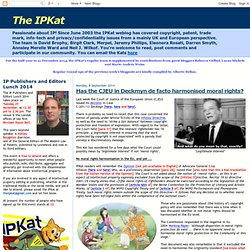
There is probably no need to recall that this case concerned the notion of parody under Article 5(3)(k) of the InfoSoc Directive, as well as the need to "strike a fair balance" between copyright protection and freedom of expression. With regard to the latter, the Court held [para 31] that the relevant rightholder has "in principle, a legitimate interest in ensuring that the work protected by copyright is not associated" with a parody that conveys a discriminatory message.
Burning Fake Chagall’s, Market Integrity versus Ownership Rights – A Zero Sum Game « Center for Art Law. Burning Fake Chagall’s, Market Integrity versus Ownership Rights – A Zero Sum Game Posted on By Hanoch Sheps, J.D.
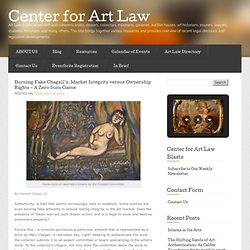
Authenticity: a trait that seems increasingly hard to establish. Some entities are even burning fake artworks to ensure lasting integrity in the art market. Does the presence of ‘fakes’ warrant such drastic action, and is it legal to seize and destroy someone’s property? STLR Symposium: Digital Copyright.
Droit moral architecte. 213-282. Against Moral Rights. CC and moral rights. ABC_Copyright_fr.pdf. Copyright et droit d'auteur (int) Un article de JurisPedia, le droit partagé.
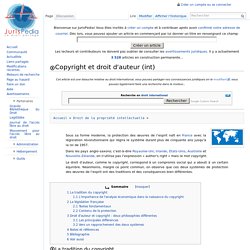
Sous sa forme moderne, la protection des œuvres de l'esprit naît en France avec la législation révolutionnaire qui régira le système durant plus de cinquante ans jusqu'à la loi de 1957. Dans les pays anglo-saxons; c'est-à-dire Royaume-Uni, Irlande, États-Unis, Australie et Nouvelle-Zélande, on n'utilise pas l'expression « author's right » mais le mot copyright. Le droit d'auteur, comme le copyright, correspond à un compromis social qui a abouti à un certain équilibre. Néanmoins, malgré ce point commun, on observe que ces deux systèmes de protection des œuvres de l'esprit ont des traditions et des conséquences bien différentes. LE DROIT MORAL DE L’AUTEUR DÉCÉDÉ en France et en Allemagne. Il faut cesser d’amalgamer droit d’auteur et copyright. 19 octobre 2012 LD27 réactions Tandis que les anciens modèles économiques de distribution et de production de la culture se fissurent avec la dématérialisation et le téléchargement, un certain nombre de nouvelles théories émergent, des réflexions se forment, sur l’évolution de l’art et la rémunération de ses acteurs, du créateur au distributeur.
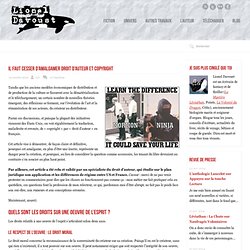
Are Moral Rights Human Rights? Presentation to BLACA/IPKat seminar ... Eleonora_Are%20moral%20rights%20human%20rights%20BLACA%20(finale) Results of Search for 'bibliosubject.subject contains COPYRIGHT : FORMALITIES AND RIGHTS : MORAL RIGHTS ' Thinking of moral rights ... in Paris (ça va sans dire) Even when she is in Paris, the trees are blossoming, and there are no actual IP disputes at stake or even just in sight, can a Kat truly stop thinking about potential copyright issues?
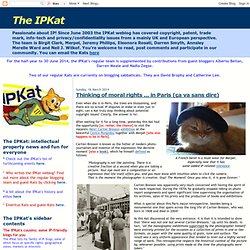
Clearly, the answer is 'no'. After waiting for it for a long time, yesterday this Kat had the opportunity [or, rather, the chance] to visit the majestic Henri Cartier Bresson exhibition at the beautiful Centre Pompidou together with Merpel [who also happens to be in Paris]. Cartier-Bresson is known as the father of modern photo-journalism and inventor of the expression 'the decisive moment' [also a book], which he himself defined as follows: "Photography is not like painting. There is a creative fraction of a second when you are taking a picture.
That is the moment the photographer is creative. Cartier-Bresson was apparently very much concerned with having the spirit of his work respected. "Are moral rights human rights?": come and find out! Blaca, formerly known as the British Literary and Artistic Copyright Association, is exceptionally delighted to announce a special joint meeting with the IPKat on Wednesday 12 February to examine the question "Are moral rights human rights?

" Now, we Kats know the answer to this as well as other questions, but we are happy to let others have their say too. The two principal speakers are our own dear Eleonora Rosati, who is far too well known to say anything about here, together with Graham Smith -- author, IP partner at the London office of Bird & Bird LLP, author of the Cyberleagle blog and generally very nice and much appreciated soul. The meeting will be hosted by Bird & Bird at its offices at 15 Fetter Lane, London. Admission will be from 5:00 o'clock, with the seminar beginning at 5:30 pm.
The seminar will be followed by a drinks reception, kindly hosted by Bird & Bird. In keeping with time-honoured IPKat custom and with the kind cooperation of Blaca, admission is free. TRIPS Agreement, Articles 9-14. 1.

Copyright and Related Rights 2. Trademarks 3. Geographical Indications 4. 5. 6. 7. 8. 1. User Prof. William T. Fisher III. Copyright and Moral Rights in the U.S. and France. Moral right in France: towards a pragmatic approach. Le droit de la propriété intellectuelle sur internet - Carine Jezequel, Alexandra Lemmenicier et Ludovic Blin.